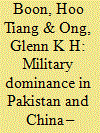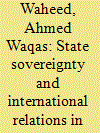|
|
|
Sort Order |
|
|
|
Items / Page
|
|
|
|
|
|
|
| Srl | Item |
| 1 |
ID:
183366


|
|
|
|
|
| Summary/Abstract |
The China–Pakistan Economic Corridor (CPEC) has been touted as the centrepiece of China’s Belt and Road Initiative and the key to its strategic partnership with Pakistan. Notwithstanding claims about the CPEC’s economic potential, however, Islamabad’s economy continues to be dire. This article attempts to better understand the ramifications of Pakistan’s economic viability and its consequences for China. It does so by examining China–Pakistan relations from the lens of Pakistan’s civil–military relations, paying attention in particular to what the Pakistan Armed Forces (PMA)’s domestic dominance means for China’s interests, including economic interests, in Pakistan. We suggest that PMA preponderance and its attendant influence on the country’s economic performance bring another dimension to interpreting Sino-Pakistani relations. As Beijing’s most trusted political partner in Pakistan, the PMA’s local dominance has considerable benefits for China, particularly in the security and political aspects of its interests. However, this dominance also entails a number of complications for Chinese economic interests, a factor that has implications for the future of China’s CPEC investments and their financial sustainability.
|
|
|
|
|
|
|
|
|
|
|
|
|
|
|
|
| 2 |
ID:
156527


|
|
|
|
|
| Summary/Abstract |
In Pakistan, the field of international relations (IR) theory remains firmly embedded in the ‘realist’ tradition, to the detriment of a wider range of considerations. This stranglehold, strengthened by the particular evolutionary trajectory of the Pakistani state as well as a complacent academia, seems to have created a vicious circle of knowledge reproduction, reinforced by various bids for power, or proximity to it. This article scrutinises specifically the dominant understandings in Pakistan of state sovereignty and security in a broadly historical perspective, showing how the rise of the military, combined with security paranoia, has prevented academic creativity in this field, including scrutiny of recent concerns over rather close China–Pakistan links.
|
|
|
|
|
|
|
|
|
|
|
|
|
|
|
|
| 3 |
ID:
165880


|
|
|
|
|
| Summary/Abstract |
Despite the continuous risk posed by transnational militancy to Chinese interests in Pakistan, China and Pakistan have improved their cooperation on matters of security and economy in recent years. While transnational militancy in a state dyad is known to increase the potential for conflict, it may also spur interstate cooperation on counter-militancy operations under certain conditions. This article examines the sources of the increase in Sino-Pakistani cooperation in fighting transnational militancy. Pakistan was in the early 2000s the country where the Chinese experienced most militant attacks resulting in the cancellation of Chinese projects in Pakistan despite the dyad’s professed all-weather friendship. More than a decade later, the Chinese are back with a prospected $62 billion in investments in the China–Pakistan economic corridor (CPEC). This overarching incentive has altered the challenge of transnational militancy to their mutual relations from a mostly negative, to a more constructive one requiring costly cooperation. In a quest to secure a continuing relationship in a hazardous landscape, the state dyad is attempting to roll out a concerted security strategy involving the army, navy, paramilitary forces and private security companies. A mix of domestic policies of both states, their foreign policies and the nature of threat posed by the militants facilitates this cooperation.
|
|
|
|
|
|
|
|
|
|
|
|
|
|
|
|
|
|
|
|
|